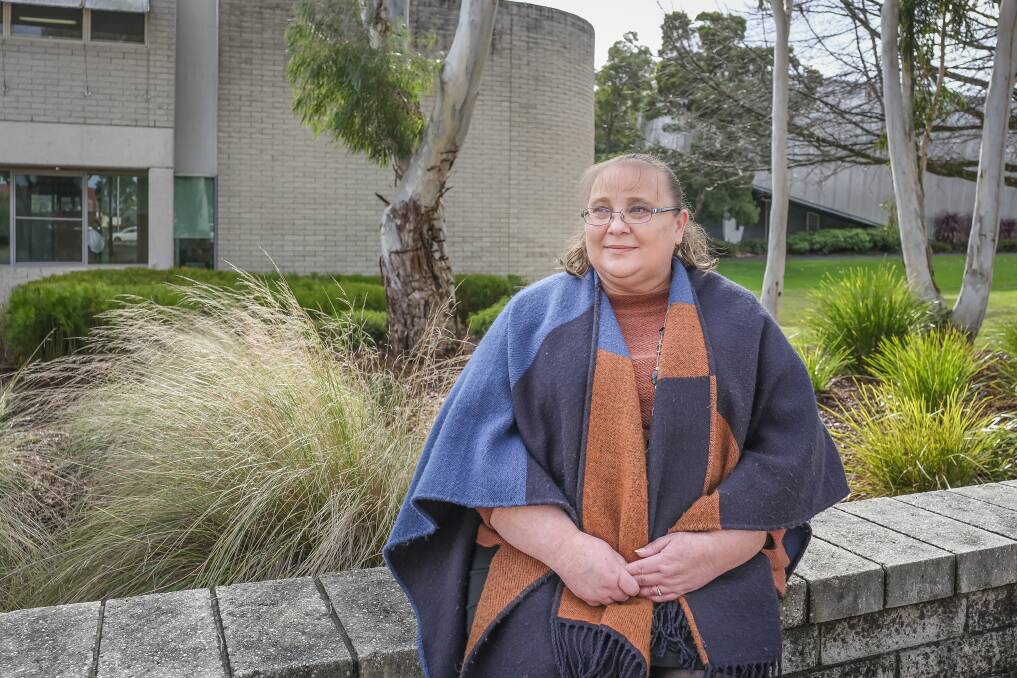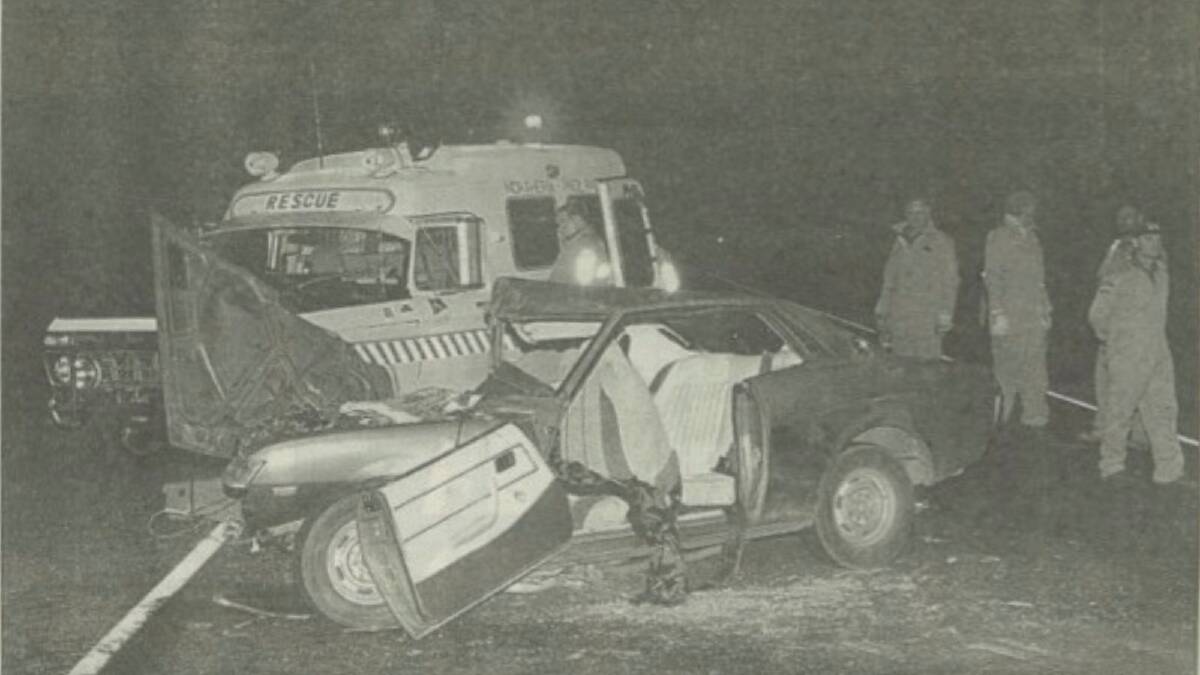
A fatal crash on the Midland Highway on July 27, 1996 changed the lives of six people forever and ended the life of a seventh.
Subscribe now for unlimited access.
or signup to continue reading
Twenty-five years on, the ramifications of that day are still felt by the occupants of one of the vehicles.
And while it won't be added to the 1996 road toll, the crash claimed a second victim more than two decades later.
Speaking on the anniversary of the crash on Tuesday, a survivor from one of the cars said she remained traumatised by the incident and still struggled to drive at night.
"A lot of people seem to think when people have accidents that once the scars are gone the injuries are better, but that's not just it," now 46-year-old Katrina Richards said.
When the Richards family left for their usual weekend drive in 1996 it was a typical Launceston winter's day.
Andrew Richards, 16, was at the wheel trying to be passed onto his provisional license.
His 21-year-old sister Katrina was in the family van, a 1985 yellow Ford Spectron, along with their parents Robert and Roslyn.

They had been travelling along the Esk Highway, had recently turned onto the Midland Highway and were heading back to their home at Invermay.
The 6pm news was playing on the van's radio, dusk was taking control of the day and Katrina was watching the middle lane of the highway scurry alongside her window.
The next thing she knew a green 1974 Toyota Celica had crossed into the lane and collided with the van.
Crushed metal and shattered glass followed, leaving both cars immobile and a trail of damage strewn across the highway.
The Richards' family van left the western side of the road and rolled before landing back on its two wheels in a shallow ditch.
The female driver of the green coupe died instantly, and the passengers were conveyed to the Launceston General Hospital.
The entire Richards family followed.
Andrew was pinned by the van's steering wheel and struggling to breathe while Katrina was trapped and had suffered extensive injuries including a broken femur.
Andrew would remain in hospital just past Christmas with internal injuries and a broken tibia, fibula and femur, while Katrina was treated for her physical injuries and then eventually able to return home.
Their parents were left bruised and shocked, but mentally scarred by the ordeal that left both of their children with lifelong physical and psychological injuries.
A coroner's report would later reveal the driver of the sedan, Christine Rhonda Anthony, had been driving under the influence of alcohol and without a licence when she collided with the Richards' van.

Ms Richards said the coroner had deemed the Anthony fully responsible for the collision.
She said Anthony was revealed to have been a disqualified driver who had been drinking throughout the day.
It was understood Anthony had earlier in the day left the Hobart suburb of Gagebrook, travelled to Launceston, and was on her way back home when she crossed into the Richards' lane.
Ms Richards said she was found to have been more than three times over the blood alcohol limit.
Her brother Andrew was told there was nothing he could have done to avoid the collision and his driving was not to blame.
Despite the coroner's findings, Katrina said her brother continued to blame himself, often asking "what if I'd moved over", until he tragically ended his own life two years ago, adding his life to the toll from the 1996 crash.
For Katrina, the crash remained a heavy burden she had to physically battle with every day in its aftermath.
She had since had 11 operations to repair her leg and was set for a 12th. Her love for the obscure sport of vigoro was snatched from her, and she still flinched when behind the wheel.
When I see cars overtaking other cars when they come towards me, they might be a mile down the road, but I get nervous.
- Katrina Richards
"And I still can't drive and can't travel at night."
The Richards family's story is one regularly repeated when fatalities are recorded on Tasmania's roads.
The road toll in 1996 was one of the highest ever recorded. Sixty-six people lost their lives on roads that year.
After a double-fatality on the Midland Highway last week the state's road toll for this year rose to 20, two higher than the previous year and at a rate of one every 10 days.
If the rate was to continue it would see the road toll reach the equal highest point in the last decade.
Another serious crash occurred at Richmond on Monday night when a 22-year-old man from the area lost control of his Toyota Hilux and crashed into a tree about 10.30pm.
The man remained in a critical condition at the Royal Hobart Hotel on Tuesday evening.
A counsellor for Road Trauma Support Tasmania, a group providing counselling to Tasmanians who are affected by car crashes, said the extent of people impacted by crashes was profound.
"Road trauma not only affects directly the people involved in the crash, but also friends and family members and in some cases whole communities, witnesses and those first on the scene, including emergency services," the counsellor, who wished to remain anonymous, said.
When a person has experienced the death of a loved one or has sustained life-changing injuries, they are forced to deal with a different life and significant adjustments need to be made.
- Road Trauma Support Tasmania counsellor
The group continued to see about 70 new clients every year, with the amount of time the client retained the service dependent on how they responded to the trauma they suffered.
"Traumatic reactions to a crash can happen straight away or some time later, they can be mild or severe and can affect every aspect of a person's life," the counsellor said.
"Some cases result in a crippling traumatic state, however, even a 'minor' crash can be very unsettling.
"Some common experiences are feelings of emptiness, anger, guilt, fear, confusion and disbelief. Panic attacks, flashbacks, mood swings, wanting to cry all the time and changes in sleeping patterns are also common experiences."
In sharing her story Katrina said she wanted to reiterate road safety, and that the memories of a serious crash are never forgotten.
"People need to think, not only about their actions, but about the aftermath," she said.
You're not getting just knocked through having the car accident, you're having to deal with the aftermath, and that goes on for years.
- Katrina RIchards
She said while the crash had led to ongoing physical disability, being open about her story in the past had helped her stay on top of her psychological condition and encouraged the same process for anyone else in her position.
Katrina was trying to track down a kind-hearted passerby who stood by her side until she was freed from the van and put in an ambulance. If this was you, or somebody you know, email b.duggan@examiner.com.au.
- Lifeline 13 11 14
- BeyondBlue 1300 22 4636
- Road Trauma Support Tasmania 0427 487 251
Our journalists work hard to provide local, up-to-date news to the community. This is how you can continue to access our trusted content:
- Bookmark www.examiner.com.au
- Make sure you are signed up for our breaking and regular headlines newsletters
- Follow us on Twitter: @examineronline
- Follow us on Instagram: @examineronline
- Follow us on Google News: The Examiner














